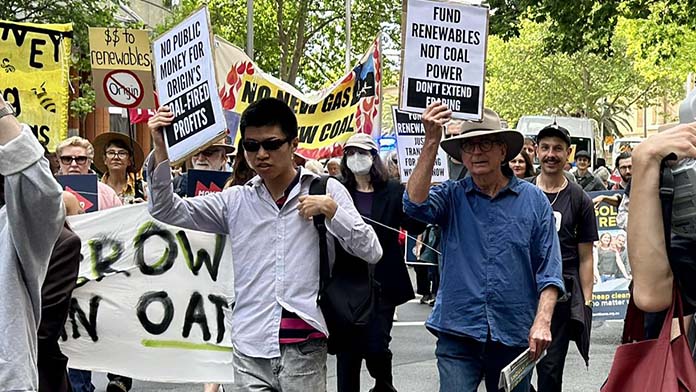The Minns Labor government in NSW has struck a deal with Origin Energy to extend the life of the coal-fired Eraring power station from its original closure date of 2025 until 2027.
This announcement comes although official forecasts show that the state is not on track to meet the emissions reduction targets set for 2030 by Minns’ own government in November.
Rather than use government funding to speed up the transition to publicly-owned renewables, the Minns government has opted to use taxpayer money to keep Australia’s largest coal-fired power station in business for another two years, with the option of keeping it running until 2029 if Origin wishes.
While NSW Energy Minister Penny Sharpe has claimed that the deal is necessary to “keep the lights on”, the Australian Energy Market Operator says there will be no power cuts if promised renewable energy and transmission projects are delivered on schedule.
The deal ensures Origin’s profits will keep flowing. It will be able to opt in to a system where it can be compensated for up to 80 per cent of losses per year by the NSW government, capped at $225 million, but have to share just 20 per cent of profits, capped at $40 million a year.
Keeping the lights on
In the two years since Origin announced the closure of Eraring, the company has made no attempt to build replacement power generation to address any shortfall in energy supply that might result.
The decision to construct a battery at Eraring was finalised only a year after the closure had been announced and its construction would not have been completed before the original closure date in 2025.
Across the board, the transition to renewable energy has stalled even though building new renewable projects could solve the problems that this extension will supposedly address.
Dr Jennifer Rayner, head of policy and advocacy at the Climate Council, stated following the announcement that, “Solar, wind and storage projects in the pipeline can more than meet the electricity needs of every home and business in NSW.”
If the government were truly concerned with keeping the lights on then they would have spent public money expediting this transition instead of extending the life of an ageing power station.
It’s entirely possible that Eraring could break down and cause a blackout, as ageing power stations like it are increasingly failing in the heat, when power demand is at its highest. But the deal just requires Eraring to produce an annual minimum amount of electricity—there is no penalty if it isn’t available when it’s needed.
Some workers have welcomed the deal as extending their jobs. While it will provide an extra two years of work for those currently employed at Eraring and there are mentions of transition plans in the agreement, the 1000 workers at the Myuna and Mandalong mines face losing their jobs after the mines’ contracts with Eraring end early next year, as Origin secures cheaper coal elsewhere.
The deal is just one example of the continuing government support for fossil fuels. Across the country new fossil fuel projects are being approved by state and federal Labor governments.
There are 18 new coal projects under assessment in NSW, including Glencore and Yancoal’s Hunter Valley Operations Continuation Project, which would be the largest coal mining proposal in the state’s history and release more than 1.2 billion tonnes of carbon emissions.
Privatisation
More than just an indictment of Labor’s climate policy, the extension is also a clear demonstration of the failure of privatisation.
Origin bought Eraring from the state Liberal government for $50 million in 2013 and now will be paid up to $450 million by the state Labor government to keep it running, having profited significantly from it in the years between.
The Labor government admits this; when the deal was announced, Treasurer Daniel Mookhey said that, “Had Eraring remained in public ownership, an agreement like this would not have been necessary.” But Labor remains unwilling to invest in publicly-owned renewable energy and so is doomed to repeat these failures.
If we want to avoid the worst effects of the impending climate catastrophe then we urgently need a just transition to 100 per cent publicly-owned renewable energy.
Since coming to power Minns and Albanese have proven that they won’t deliver this and, with decisions like the extension of Eraring, they are actively pushing us further from it.
Only a mass movement in the streets that combines the demands of the climate movement with the power of the organised working class can win the sort of action needed.
By Angus Dermody






